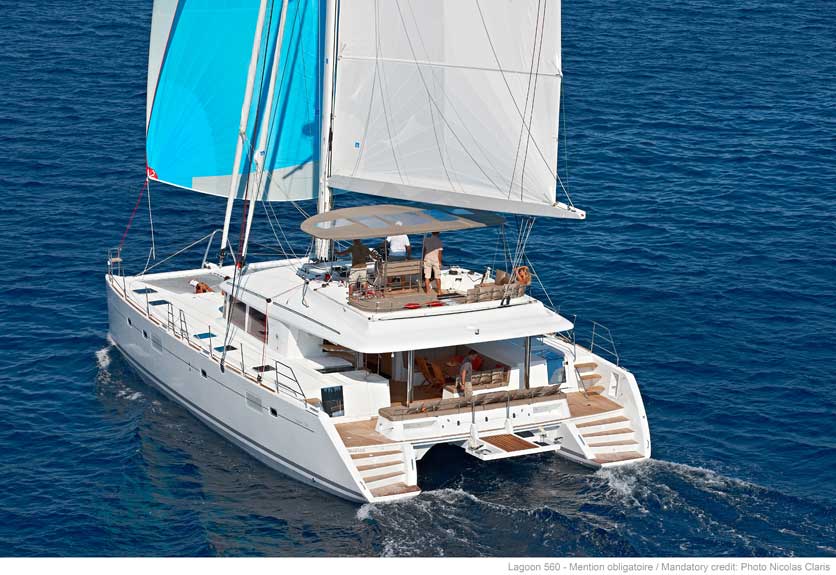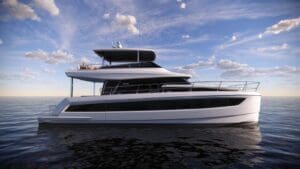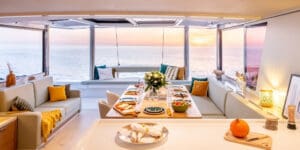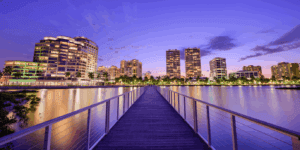Overseas Radio Network – Get Off the Grid & Travel In Your Home
 Topics in Overseas Radio Network Show 7, Segment 1:
Topics in Overseas Radio Network Show 7, Segment 1:
In this series, we will be talking about getting off the grid. We start with:
- Visiting countries taking your home with you
- Enjoying the freedoms of sailing
GARY FRETZ: Ahoy, mates! This is your host Gary Fretz with my co-hosts here today, Stephen and Estelle Cockcroft. And our show is about “Yachts: The Perfect Escape Vehicle”. Now, you might be wondering why yachts makes the best escape solution. Well, it is because you can find live aboard yachts for $15,000, $15-million, and everywhere in between. They serve as your home and they provide inexpensive transportation around the world.
For a transcript of this podcast, click “read more” below.
Yes, it’s possible to sail around the world for next to nothing using windpower. And if you’d like to know how to do that just stayed tuned.
So today we are going to talk about getting off the grid. Stephen, you want to start this?
STEPHEN COCKCROFT: Yeah, sure, Gary, a sailboat is really, in my opinion, the only true freedom left on the planet. If you want to go somewhere, you don’t need to go catch a bus, a train, a plane, go through customs, buy a ticket. Sailboats are things that, you know, can go anywhere. They have limitless range because they are wind driven. And as long as you put enough food and have a reliable water maker, you pretty much can go anywhere on the planet so that’s why I believe sailboats are the only true freedom left on the planet.
Just think about it. You decide that you are going to visit a foreign country so you provision up and off you sail. It may be a month island of hopping or maybe do an ocean passage depending on how adventurous you are to get to your destination. When you get there, you’re going to sail in and probably drop your anchor which you own, you’ve paid for. You drop the anchor, it hooks at the bottom, and you are now in a foreign country and you have arrived with your entire household or your personal stuff: your favourite duvet, your slippers, your pipe, whatever, you do. But you have arrived with your entire household.
You don’t arrive there and think, “Okay, now I got to find a place to stay, find a hotel, or rent an apartment,” because you have brought your entire household with you like a giant tortoise. You know if you rent in a foreign country, you gonna have to find a way to hook up electricity and all the other stuff. With your house you there and you pay nothing because you are hooked on your own hook.
Generally, you find that you go to places where there are waterfront type cities or waterfront places or islands where which are boat friendly. Along with your house or your boat that you sail, your abode, you have a dinghy and so your dinghy becomes your car. And you can go to the different docks you can go to visit people. So essentially you have transport to commute along with you.
I guess if you want to think about a yacht, it is like a miniature city. You know, it doesn’t rely on the outside world for anything. For power the boat has batteries so it has a 12-volt system and 110 system. The 12-volt system drives the lights and the boat systems and the many ways to charge your batteries. You know, solar panels are great because the sun is free. [Read our review about Aurinco Solar Panels and tips on selecting solar panels for your catamaran.]
Wind generators are also good the wind is also free. Estelle really likes wind generators, don’t you?
ESTELLE COCKCROFT: Yeah, I particularly love that whirling sound above my bed, Stephen, thanks. [Read our review about the AIR Silent X Off-Grid Marine Turbine.]
STEPHEN: We had a few very interesting wind generators one with a 60-inch wooden blade looks like something a tiger moth used to use. That thing use to make a huge amount of noise, but today very quiet and very efficient. So you generate your own power. Generally, boats now have their own generator which is diesel drive which is another source of power and of course you got alternators on your engines so got multiple ways of generating your own power so you have your own power station.
Water today, water makers are very efficient so basically what you do is you generate your own water you have your own water maker you desalinate or it is called reverse osmosis where you are sucking up sea water and putting it through membranes at high pressure and you getting fresh water so you don’t need any water you totally independent you never have to go ashore for water for water as long as you have power which is free through solar and wind, etc.
Of course, your propulsion is wind so that doesn’t cost you anything to get anywhere. If you get to a place where it is really hot or, you know, maybe cold, most boats have your power control, you have air conditioning. So you can either run your generator to heat the boat up or cool it down. So essentially a sailboat is a self-contained little island that you can move anyplace that you want off the grid you really on no services no land bound facilities what so ever except every now and then you got to fill up with diesel.
When you cruising you probably full up with diesel maybe twice a year. So that’s my take on getting off the grid with a sailboat.
GARY: That reminds me of a client I had who was a German guy who sailed around the world twice in a Lagoon catamaran. And he came to me to buy another boat because he was going to go around 3 times. And he told me that one time, when he sailed around the world, he spent $300 on fuel. And I said,
“What? How did you do that?” And this guy would only use the engines for getting in and out of the harbor, that’s it.
And the moment he got to the sea buoy he would turn the engines off and that was it. And I said, “What if you are like in the doldrums?” He said, “I don’t care. I would just sit there sometimes for 3 days, 4 days and we’d just be sitting there with no wind.” And he said, “I like to putter around the boat. I like to read. I just love being on the boat.” And so it wasn’t a matter of saving money because this guy is loaded.
He had a house that sold in Majorca for €5 million. And so he just loved being on the boat. So you don’t have to spend a lot of money on fuel if you have the right systems. Stephen, now tell me how would you chose your boat. What comes first when you are looking at a boat that you can live on?
STEPHEN: We are on out 3rd boat and comfort. Comfort is the issue I believe you want to have comfortable salon where you can lounge. You want to have nice good seating. And you want a decent size cabin. We tend to spend a little bit of money on the mattress in the cabin because you know if you are sleeping on a piece of foam that is getting crushed and becoming very uncomfortable, so mattress is important. Size of cabin is important that’s part of comfort issue.
The reason why I like catamarans is because it all speaks to comfort. You don’t have a roly-poly situation where you might be in an anchorage and you are rolling gunnel to gunnel with swell coming in. A catamaran just goes up and down and it is very comfortable.
Also we look at the head, which is the toilet. The shower is important. You don’t want to be standing on one leg bent over trying to shower. You want a nice big shower cubicle and a nice big comfortable boudoir. Running out of time for this segment I am going to give you back to Gary and carry on in the next segment.
GARY: I just wanted to add quickly that I think comfort absolutely is the way to look for a boat. And you know I see these buyers who come to me looking they want speed, you know. But when you trade off comfort for speed, you are only talking about an increase of a couple miles an hour, so I don’t know if it is really worth choosing a boat for that.
Anyhow we are going to take a short break and we will be right back you are listening to “Yachts: The Perfect Escape Vehicle” only on Overseas Radio Network and this is Gary Fretz.





